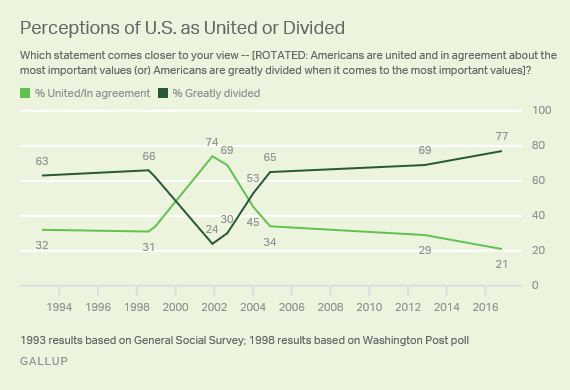
If there was anything the recent presidential campaign demonstrated vividly, it is that the US may be the most ideologically polarized and divided it has ever been in its history. And, according to a Gallup, this has now been officially confirmed: in a survey released overnight, a record 77% of Americans believe the US is divided on the most important values, while 21% believe it is united and in agreement. Over the past 20+ years, the public has tended to perceive the nation as being more divided than united, apart from two surveys conducted shortly after the 9/11 terrorist attacks.
The poll was conducted on Nov. 9-13, one day after the November 8 election and after a contentious presidential campaign involving the two of the least popular candidates in postwar U.S. history. It found that all major subgroups of Americans share the view that the nation is divided, though Republicans (68%) are less likely to believe this than independents (78%) and Democrats (83%). That is consistent with the findings in the past two polls, conducted after the 2004 and 2012 presidential elections, in which the winning party's supporters were less likely to perceive the nation as divided.
According to Gallup, Americans are also split about evenly on whether Trump will do more to unite the country (45%) or do more to divide it (49%). These views largely follow party lines, with 88% of Republicans believing Trump will do more to unite the country and 81% of Democrats saying he will do more to divide it. Independents predict Trump will do more to divide (51%) than to unite the country (43%).
Gallup has asked the same question in the past on several prior occasions, including in November 2004 after George W. Bush was re-elected, in February 2008 during the presidential primaries, and in November 2012 after Barack Obama was re-elected. Americans are less optimistic about Trump bringing the country together than they were about Bush and Obama in those instances.
By 57% to 39%, Americans in 2004 thought Bush would do more to unite the country than to divide it. Americans responded similarly about Obama in November 2012, with 55% saying he would unite the country and 42% divide it. Americans were even more optimistic about Obama bringing the country together (66%) when he was campaigning in the Democratic presidential primaries in early 2008.
As with Trump, perceptions of whether Presidents Obama and Bush would unite the country largely fell along party lines. But independents were more inclined to see Obama and Bush as uniters than they are to see Trump this way.
So what, according to Gallup, are the impications? As Trump prepares to take office, a record number of Americans perceive the nation as divided and less than half believe his actions will help unite the country. "Those perceptions may reflect his blunt speaking manner and sometimes divisive campaign rhetoric, though he did call for Americans to come together in his victory speech."
Ironically, both Obama and Bush made unifying the country key goals of their campaigns and administrations, and Americans perceived each as likely to do more to bring the country together than drive it apart, and yet each wound up having job approval ratings among the most politically polarized in Gallup's history: in other words they failed. That polarization may have resulted from the realities of partisan politics in Washington and the difficulty of bringing together a governing coalition that crosses party lines. It may also have resulted from the rise of new media as a forum for opinion leaders on the right and left to express their views and for Americans to seek out news coverage and commentary that fits their political predispositions.
Trump's ability to unite the country is also handicapped by the limited goodwill he has from the opposition party. About one in 10 Democrats have a positive opinion of Trump, far less than the three in 10 Democrats who viewed Bush positively in 2000 and the roughly one in three Republicans rating Obama positively in 2008.
Then again, if Trump has proven one thing so far it is that everything that was "conventionally accepted" about him, also ended up being wrong. Perhaps this "most unpopular president ever" will also be the one to surprise the public and achieve what both of his predecessors failed to do. In the worst case, with expectations already at record low levels, at least he won't disappoint.